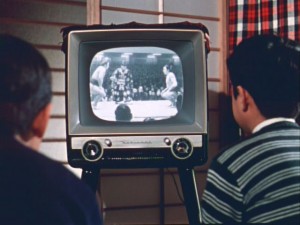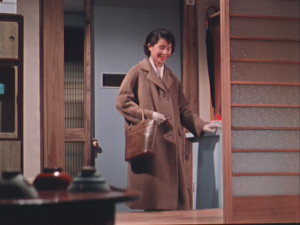Taking the Yellow Out of the Yellow People
 Having watched Yasujiro Ozu’s Good Morning on DVD, I may have to turn in my snob card, or maybe I should get a special dispensation. Is it because I watched this movie in particular? No. It’s a gentle comedy on the surface, and a pretty rough criticism of Japanese culture underneath. This is because of the way that I watched it. This movie was shot in technicolor, and released in Japan in 1959. Ozu’s films really didn’t come to the US until the mid 60’s. When Good Morning was shown here, it was in black and white. Until I put the disc in, I didn’t know why they would do this intentionally, as the US is generally a place where black and white is looked upon as ancient, and colorization should be done whenever possible.
Having watched Yasujiro Ozu’s Good Morning on DVD, I may have to turn in my snob card, or maybe I should get a special dispensation. Is it because I watched this movie in particular? No. It’s a gentle comedy on the surface, and a pretty rough criticism of Japanese culture underneath. This is because of the way that I watched it. This movie was shot in technicolor, and released in Japan in 1959. Ozu’s films really didn’t come to the US until the mid 60’s. When Good Morning was shown here, it was in black and white. Until I put the disc in, I didn’t know why they would do this intentionally, as the US is generally a place where black and white is looked upon as ancient, and colorization should be done whenever possible.
But after about 7 minutes, I couldn’t take it anymore. The technicolor was so ugly, everything was so unpleasant to look at, especially the obnoxious browns and oranges, that I simply watched it in black and white. Is this a sacrilegious act because I didn’t watch the movie in the way that the director intended? Is there some subtlety that I may have missed because I had removed the color? Maybe, but I certainly wouldn’t have been able to sit through the whole movie had it been in color. And yes, sometimes I did switch back and forth occasionally, and each time, I felt better about my decision. The black and white was smoother and not nearly so harsh. It had a simple elegance that was entirely missing from the color version.
The thing to remember about the film is this; for the opening 40 minutes it’s quite slow and meandering and doesn’t really get interesting until the main notion at the center of the movie sets in.
Essentially, the film is about two kids who live in a crowded Japanese village and are always sneaking off to a neighbor’s house to watch Sumo Wrestling, because they don’t have a TV at home. Their parents refuse to buy one for them and this causes quite a rift in the family. There’s an argument that ensues where their oldest child points out that adults don’t really talk about anything interesting at all, just boring hellos all the time and nothing important ever gets discussed. Their mother and father tell him and his little brother that they talk too much, and so the children decide they won’t talk at all, for 100 days. Seemingly a silly point of rebellion, this begets an odd reaction in the community, people think that the family is angry at them because their children won’t talk or respond to them, and causes resentment and grudges to erupt because of all of the assumptions made.
There is so much going on in this movie, and yet the whole thing is deceptively simple.
The adult women (usually housewives) engage in petty bickering and rumors to an excess, they seem to revel in looking on down on each other, and find ways to misinterpret simple situations so they can develop new ways to complain. The only woman who seems to have any sense is the one who works as a car salesman. Another message about how people with too much time on their hands have to create their own problems in order to seem necessary.
 There’s a subtle criticism of the overt politeness of the Japanese people, surely a cultural act of repression, which results in endless meaningless small talk about the weather and a constant need to use repetitive greetings (hence the movie is called Good Morning) as social lubricants. Only one time is the dialogue “on the nose.”
There’s a subtle criticism of the overt politeness of the Japanese people, surely a cultural act of repression, which results in endless meaningless small talk about the weather and a constant need to use repetitive greetings (hence the movie is called Good Morning) as social lubricants. Only one time is the dialogue “on the nose.”
“Important things are hard to say. Meaningless things are easy to say.”
There’s the constant talk about old age and about having thrown your life away to a company that was smart enough to make sure that you’ll never be financially comfortable enough to retire on them.
And there’s some very funny material about how to deal with persistent salesman who use social pressure and guilt to make you buy something.
All this is mixed in with either pro-TV discussion or anti-TV discussion, depending on your viewpoint. If the parents had bought the TV in the first place, would the children never have to have gone through all this effort, revealing the parents to be dull hypocrites? Was it a good idea because it may make them realize how pointless their lives have been to this point, and perhaps make them try to change?
And the most important detail, this is clearly the winner of the contest, by far most farting in a movie released by Criterion. The gas passing is incessant, far beyond what is at first a joke and then becomes a motif. Really, a movie in which a character shits his pants, not once, but twice, should be seen by everyone.



